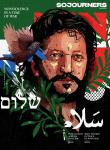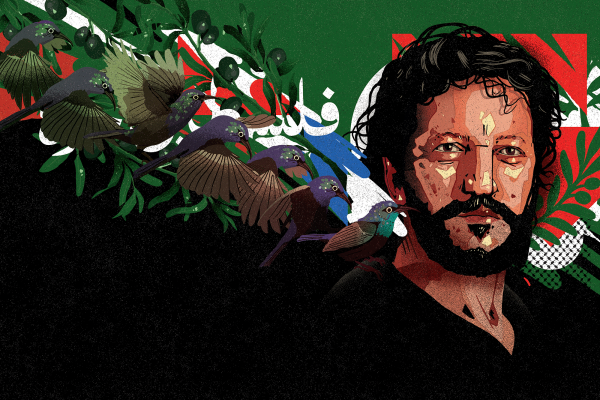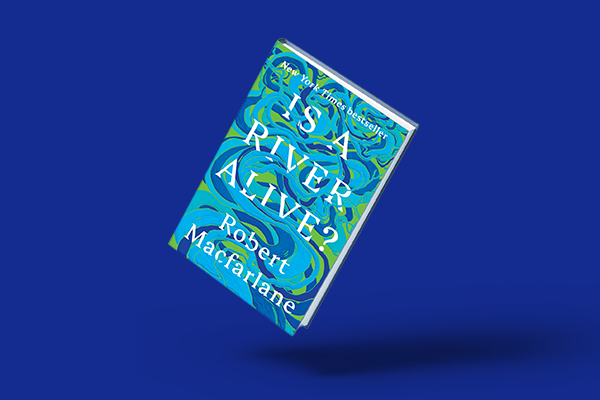A CORE PRINCIPLE of nonviolence is recognizing the humanity of your opponent. In time of war, that principle does not become irrelevant or obsolete — it becomes more difficult, and essential. In the wake of Hamas’ brutal Oct. 7 attack, as Israel’s retributory assault was gearing up, Ali Abu Awwad, a nonviolence activist who lives in the West Bank, wrote: “Now more than ever, we all must refuse to use violence to justify more violence. We should not allow our pain to blind us to what is most needed: mutually guaranteed sovereignty, security, and dignity for both Israelis and Palestinians.”
At a time when even calling for a cease-fire is seen by some as an unforgivable choosing of sides, Awwad and other peacemakers insist that the “side” we’re called to support isn’t exclusively pro-Israel or pro-Palestine, it’s “pro-solution.” Awwad is clear that there is no military answer to that question: “The best way to support Israel,” he writes, “is to protect both Palestinian lives and Jewish lives.”
He’s not alone in recognizing the humanity of all involved. For instance, some Israelis who suffered terrible loss in the Hamas attacks have been among the strongest proponents of peace. Noy Katzman’s brother, Haim, was killed on Oct. 7. In her eulogy, Noy called for the end of the killing of innocents. “I call on the government and all of us not to use our death and pain to cause death and pain of other people or other families,” Noy said. “I demand to stop the cycle of pain, and understand that the only way is freedom and equal rights.” Israeli peace activist Maoz Inon, whose parents were killed by Hamas, implored Israel to stop its war on Gaza. “Revenge is not going to bring my parents back to life,” Inon wrote on Aljazeera.com. “It is not going to bring back other Israelis and Palestinians killed either. It is going to do the opposite. It is going to cause more casualties. It is going to bring more death. We must break the cycle.”
Awwad has also been the victim of violence. As a teenager, he was imprisoned for four years for participating in the protests of the first intifada. Years later, he was shot by an Israeli settler while changing a tire in the West Bank; soon thereafter he learned that his brother, Yusef, had been shot and killed by an Israeli soldier at a checkpoint. But Awwad did not succumb to the temptation to seek violent revenge. Instead, he began working with Israeli families who lost loved ones to violence, starting him down a path that led, in 2016, to the co-founding of a Palestinian nonviolence movement called Taghyeer, the Arabic word for “change.”
Awwad spoke with Sojourners senior editor Jim Rice while visiting Washington, D.C., last summer. After the Israel-Hamas war started, Stephen R. Stern, director of the U.S.-based Friends of Taghyeer Movement, decried the “unspeakable crimes and terror” committed against Israelis and told Sojourners, “The Israeli military response takes the Holy Land deeper” into an “uncharted abyss built on years of conflict ... on a precipice that might reach the truly unimaginable.” — The Editors
Sojourners: How is the Israel-Hamas war being experienced by Palestinians in the West Bank?
Stephen R. Stern: Ali and others in the West Bank have told us that there is significant despair because the war is devastating Gaza and has intensified an already insupportable level of settler and army harassment, violence, and evictions. Daily lives in the West Bank are also in a state of disruption. A colleague there reported, “Everyone suffers from trauma. There is so much sadness and anger for what is happening on the ground ... violence only leads to violence, and it will not reach a peaceful solution.”
The mid-October report from the West Bank continued: “An attack took place for four continuous hours [nearby]. Large forces from the occupation army, military vehicles, and infantry soldiers raided and the soldiers shot at some homes extensively ... They also focused on shooting at water tanks and closing roads with military jeeps. ... In the same night, the occupation soldiers continued arresting more young people, beating them and terrorizing children and mothers in addition to making them suffer through preventing them from moving between areas and regions. There is a continuing attack by settlers on Palestinians who live in border areas close to the settlements and ... an interruption in the supply of basic materials, petroleum, and medicines in these regions. ... Now the danger touches every Palestinian citizen, whether in the West Bank or Gaza.”
In late October, the Israeli military raided Ali’s house while he was out working to save lives. They ransacked the family’s possessions, and Ali, his wife, and their young son were forced to abandon their rental home. Ali and his family are safe, but they had to move to another location in the Bethlehem area.
Ali, you’ve been the victim of extreme violence by Israelis. It would be a natural human response to be angry and filled with hatred. What helped you to take a different path?
Ali Abu Awwad: The anger is there. It didn’t disappear. The challenge is not to be led by it. I’m angry, and I can be humiliated at any time, at any checkpoint. The question is, what do you do with it? What do you want from your reaction? Even if I kill someone, would that provide justice to me, my brother’s kids, to my parents who passed away? And what is justice at all? I do believe in justice, but I don’t think there are just solutions. I believe in fair solutions.
I didn’t act just from my heart. I also acted from my mind. I realized that adding another body to the thousands of victims will not get me to freedom, will not heal my wounds, and it also will not help with my political cause. In the end, I’m a leader. I’m not just someone who has been victimized and then his soul, his desire for life, was buried in the grave of my brother.
Actually, this is what the oppressor wanted: To bury my desire for life, my normal activism, my mind, in the same grave. That was my best revenge — when I refused to take revenge by physical acts. I gained the best revenge by not victimizing a human being, but rather by rejecting injustices. I’m facing the system, not the people, because I know the system is based on a lot of trauma — and stereotypes that people fall easily into, in that system, with their fear.
Jewish fear has become our biggest enemy. A step toward freedom is to heal or to overcome that fear — or at least not to create more threats.
It doesn’t mean to step into a fantasy of reconciliation — I don’t speak about “reconciliation,” honestly. Reconciliation needs values, it needs a political system, to heal a painful past. I speak about “nonviolence,” which hopefully will lead to reconciliation after a political peace agreement.
How did you begin to understand the power of nonviolence to achieve justice in Palestine and elsewhere?
During the first intifada, I saw nonviolent activism. But I was not convinced that this huge, militant, Zionist ideology can be faced with our humanity alone. The achievement of [the] Oslo [peace process] — whatever Oslo was, right or wrong — was to show that the massive, mostly nonviolent action of the First Intifada was enough to bring both sides to the table.
My personal experience with nonviolence started in prison. My mother and I were in two different prisons. We decided to have a hunger strike to visit each other, a hunger strike for 17 days. For the first time, after 17 days of starving, I finally achieved something from Israel — I was allowed to visit my mother. I started learning about nonviolence, but I still doubted it.
After I lost my brother, I had a second transformation in meeting the victims of the other side. Many Palestinians would never see Israelis as victims, but I think they are. As the Jewish people were the victims of the war, we also have something to do with it when it comes to Israeli families who have lost someone in the conflict.
When I met them, it was not just about meeting their humanity. It’s also meeting their commitment for my freedom. That was even more important. They didn’t see us just as victims who have lost someone and [therefore] deserve to be treated well. No, they stand for our legitimate political rights, which is very courageous to do, if you are the victim of the other side. So, that was my second transformation.
After I dug deep — with my doubts about nonviolence, with the failures of peace processes, with the weaknesses of anger, which I live with every day — I realized that nonviolence is not just about having a dialogue with Israelis. Dialogue is just a tool. My goal is not to have a dialogue; my goal is to solve this madness. Dialogue can help in promoting peaceful conversation. But that will not change Israeli lives, because they have their own state, they have their own system. Dialogue will not change the conditions of Palestinian daily life when it comes to legal rights.
Nonviolence is much more about a national political role that we need to take to achieve our rights. This is a tremendous national responsibility for my people. That’s why I launched this movement. It offers something that is new and will apply to our needs. It also will solve the confusion between the two identities that we have as Palestinians — the revolution and the citizenship — because when we are jumping between both, we have no idea how to deal with the extreme violence, with the right-wing minority that seems to be taking over everywhere. This can only be faced with nonviolent activism, which requires great sacrifice. This is a sacrifice you make and you achieve things—not a sacrifice that you make and you make things worse.
Is nonviolence a tactic or strategy for your political work? Or is it something deeper for you?
This is not a tactic. It’s like love: You cannot tactically love someone. Right? It doesn’t work that way — you can’t divorce strategically or love tactically. It’s also not a strategy. It’s a model of being identified with life with all its resources. Because land has something to do with it ... nationality, religion — all the values of being, when they are based on nonviolence. Even political responsibility has a lot to do with it, because this is about political leadership as well. The nonviolence leaders who managed to achieve their rights, their human rights, were not insane people who came from the moon. These are people who faced the most victimization.
On the other hand, nonviolence is the taste of my life. Without doing this, I cannot find a reason to live again, after all I have lived through. It’s the celebration of my existence. Your oppressor wants you to cry, and you smile.
But it also has something to do with the other side. Believe me, I know hundreds of people — there is enough humanity within the Jewish community, within the Israeli society, for nonviolence activism to succeed. Because you do not just disarm yourself, you disarm your enemy. Because you are not creating a threat, you are raising questions about their own identity and how they practice it. You have to bring this out of them. For that, you cannot just shift from nonviolence to violence. You have to have a strategic role with a strategic statement and a strategic vision and a strategic commitment. For me, nonviolence is my life.
The “Democracy or Rebellion” protests in Israel last summer focused primarily on the judicial coup and not so much on Israeli settlement expansion, military raids, or settler pogroms. What message do these protests carry for people committed to Palestinian freedom?
For me, democracy in Israel also has something to do with our lives as Palestinians. Almost 2 million Palestinians live in Israel, with Israeli ID and citizenship. It’s great to have Israeli voices taking responsibility about their own issues because this is what we do as Palestinians in the Taghyeer movement: We take responsibility for our people. If Israeli society can manage to stand up for their democracy, I think they can manage to stand up for both side’s rights, because this occupation is harming Israel as well. It’s not just harming the Palestinians.
That’s why one of the most important things for us as a movement is to influence Israeli society. When we stand up nonviolently, this is going to be the key for the Israeli society to stand up, proving that, when this current government says there is no partner [with which to work toward peace], we need to show that. We need to show that, not to prove to them, but to be the best servants of our goal of freedom. I think Israel cannot be normal until all life, on both sides, is normal.
What does nonviolence bring to bear in the context of what is arguably the most hard-right, anti-Palestinian government in Israel’s history?
Actually, it can only be faced by nonviolent massive national action through a strategic plan. This is not about rejecting the status quo, or saying, “We are here against certain people.” We are here for ourselves, first. Nonviolence unites Palestinians and unites Palestinian society — because there is a lot of division. Nonviolence can apply to the peaceful solutions we are aiming at; this is our vision.
Nonviolence will make this right-wing, militant system unworkable. Because it’s based on hate, on fear, on authority, while nonviolence is based on humanity and responsibility. Our nonviolence approach is not about resisting the occupation; it’s to end the occupation. Our goal is not just to resist; our goal is to end the injustices — injustices toward everyone, not just toward the Palestinians. This conflict has been going on for decades; it has taken so many lives. This conflict cannot be solved by force.
This conflict is about identity — more even than land, borders, water, Jerusalem — all the issues. This right-wing government is bringing this to the table. This will require from us a new act of nonviolence, a new political role. Let’s discuss identities. Let’s go to the core of the problem, not go around the problem. Nonviolence, for the Palestinians, is the only way to connect between two identities that are managing our lives daily: the identity of revolution against the occupier, and the identity of citizenship under the PA [Palestinian Authority] without a state.
We are confused between these two identities. In [the nonviolence organization] Taghyeer, we bring these two identities together in a national effort to reject injustices, and to apply new alternative systems that would replace the corruption, would replace the right-wing activities and projects, but also would promote citizenship and responsibility among the Palestinians themselves.
Are you hopeful that progress can be made toward a just peace in Palestine/Israel? If so, what are the foundations of that hope?
I always have hope, but it doesn’t motivate me. I cannot say that it’s my optimism that pushes me every day. I believe more than I hope, because I strategize that dream of having a solution to this madness. I have hope as a human being because people need hope. Hope is like oxygen. But I don’t think that hope is enough in this conflict. We need more responsibility. We need action plans. We need strategy. We need to strategize that hope to be effective.
What gives me hope, as well, are all those human beings on both sides who still fight every day for a solution, not each other. When I see Israeli and Palestinian mothers struggling to protect their kids without pushing them to become killers — this gives me a lot of hope.
Finally, this world is promoting so much despair. Our politicians and corrupted leadership are promoting so much despair. For me as a leader, I cannot just close my mouth. I cannot stop. I live one life, and I want this life to promote life for others after we go.

Got something to say about what you're reading? We value your feedback!






